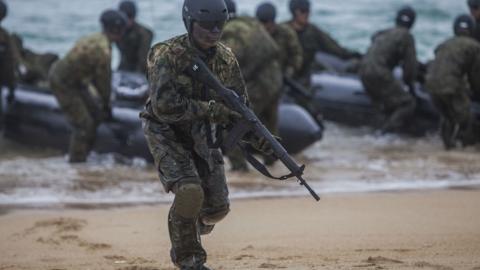Japanese prime minister Fumio Kishida’s visit to the United States in April 2024 was a historical visit because the agreement indicated that Japan will take charge of a more wider security role in the East China Sea, Taiwan and the South China Sea as a trustworthy ally of the United States.
Firstly, Japan and the United States are planning to make Tokyo to be main headquarters of military operation in this region. Currently, Japan has been planning to establish the integrated headquarters of its ground, maritime, and air Self-Defence-Forces in Tokyo by next March 2025. Along with it, during this Kishida’s US visit, the US decided to strengthen its headquarters in Tokyo to make seamless collaboration with the Japanese side. The rank of commander of the headquarter will rise from three star general to be four star general. The four-star general is at the same level with the current Indo-Pacific Commander in Hawaii.
The strengthening of the seamless command chain of armed forces in Tokyo is very important step. Currently, China is provoking countries in the East China Sea, Taiwan and the South China Sea at the same time. For China’s strategy, these areas are one set. For example, if China wants to invade Taiwan, China should dominate the East China Sea and the South China Sea to isolate Taiwan. And government in Beijing can control all these areas under one integrated strategy.
Compared with China, other countries have disadvantages because Japan, Taiwan, Philippines, are different countries and the United States is commanding from Hawaii or Washington DC, far from this region. Therefore, to neutralize China’s advantages, Japan and the United States are planning to coordinate.
Secondly, two leaders agreed to bolster joint development and production of weapons between Japan and the United States. For a long time, Japan’s restriction to export arms has prevented such cooperation. If Japan join joint arms development projects and production with the United States, it is not easy to export this to the third country. But recent security environment has changed Japan’s policies. In 2023, Japan decided to export the Patriot missiles to the United States because the United States lacked the ammunition after they provided it to Ukraine. And in March 2024, Japan decided to allow the export of Japan-UK-Italy jointly developed fighter jets to the third countries. In other words, the Western countries cannot fight without Japan’s supply lines and vice versa. And if regional countries like Philippines and Vietnam need weapons, Japan can also be a provider of defence equipment.
Thirdly, during this visit, the first Japan-US-Philippines summit was conducted. And Japan-AUKUS (Australia-UK-US) cooperation was also mentioned in the joint statement as a new move. Recently, Japan-US-Philippines-Australia naval ships conducted joint patrol in the South China Sea. Thus, these moves are one step to institutionalize the multinational security cooperation in this region. For a long time, Japan has promoted cooperation with the United States to become part of a wider network of US allies and partners. QUAD was the concept to inviting India. And cooperation with Five Eyes, inviting NATO’s Tokyo office are also the efforts of Japan. The reason was China’s rapid military modernization. It has built 148 naval ships in the last decade which is almost the total number of naval ships that Japan possesses. Thus, to maintain the military balance vis a vis China, Japan has integrated all efforts of the US and its allies and partners. Japan’s cooperation with Philippine, AUKUS indicated that Japan’s efforts to invite US allies in the anti-China circle is becoming successful.
However, the final question of Japan’s military modernization is the implications for India. Indeed, there is an impact in India’s policy, because security in the Indian Ocean is associated with the Pacific region.
China is deploying its nuclear submarines in the Indian Ocean from its underground base in the Hainan Island in the South China Sea region. Recently, Foreign Minister Subrahmanyam Jaishankar’s visited Philippines to build a wider partnership in the region. India is providing Brahmos supersonic missiles which will be the only long-range missile that Philippine possess. India is also providing military hardware and training to Vietnam. Thus, India is also important actor to deal with China. Expanding Japan’s role as a security provider opens more space for cooperation with India.

















